Family Health Assessment Report: Nursing Intervention for Samuels
VerifiedAdded on 2022/09/06
|7
|1388
|15
Report
AI Summary
This report presents a comprehensive family health assessment of the Samuels family, focusing on their health issues and needs. The family consists of Mr. and Mrs. Samuels, who suffer from hypertension and diabetes, respectively, along with their two sons. The assessment covers various aspects, including nutritional habits, lifestyle, and relationships, revealing obesity, poor dietary choices, and smoking habits. The report then outlines specific nursing diagnoses and interventions, such as dietary modifications, medication adherence, and stress management, tailored to each family member's condition. The interventions include educating the patients about their health conditions, encouraging lifestyle changes, and providing emotional support. The report also provides evaluation criteria to assess the effectiveness of the nursing interventions, aiming to improve the family's overall health and well-being. Furthermore, it emphasizes the importance of addressing both physical and emotional aspects of health care to foster a holistic approach to patient care.
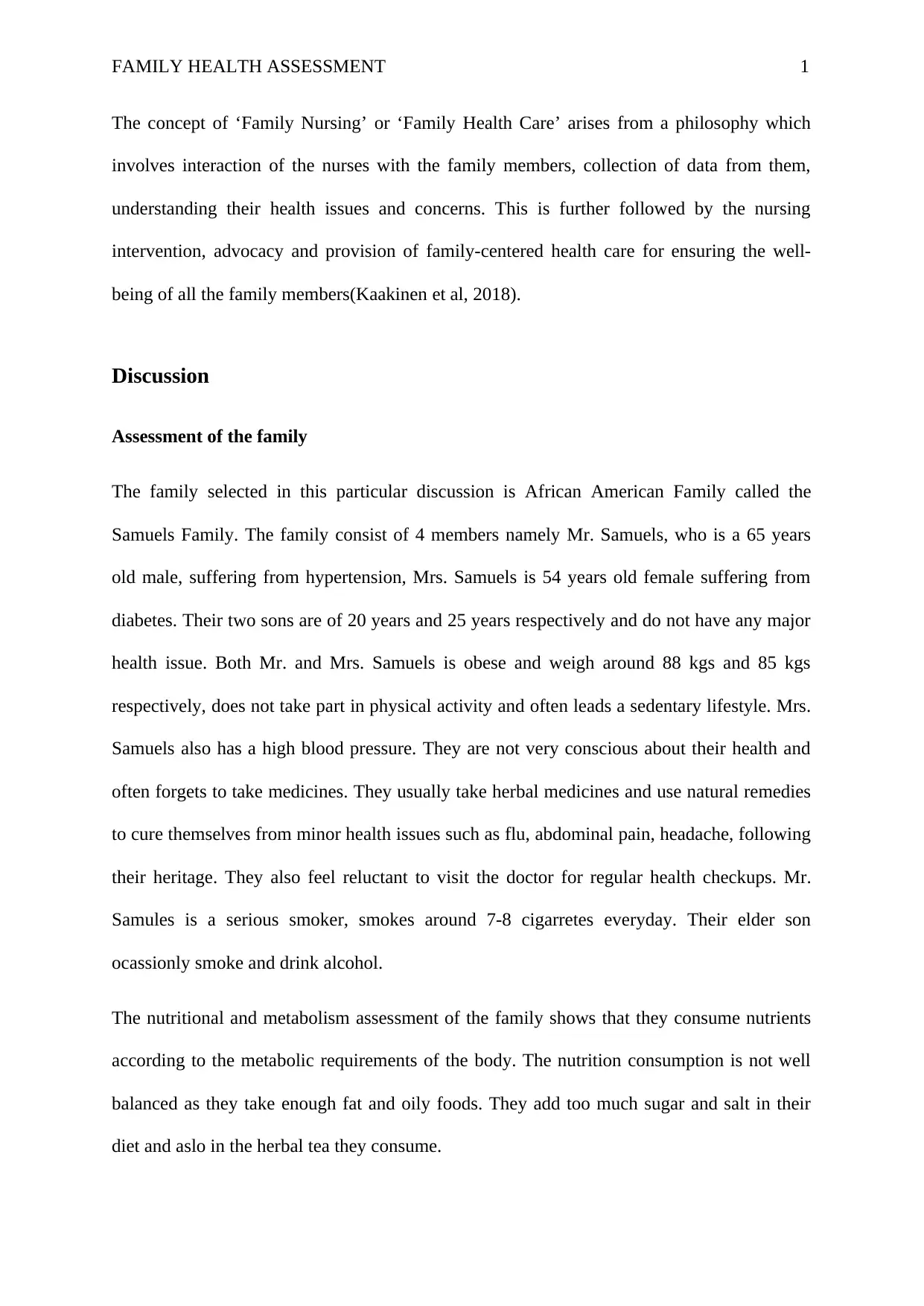
FAMILY HEALTH ASSESSMENT 1
The concept of ‘Family Nursing’ or ‘Family Health Care’ arises from a philosophy which
involves interaction of the nurses with the family members, collection of data from them,
understanding their health issues and concerns. This is further followed by the nursing
intervention, advocacy and provision of family-centered health care for ensuring the well-
being of all the family members(Kaakinen et al, 2018).
Discussion
Assessment of the family
The family selected in this particular discussion is African American Family called the
Samuels Family. The family consist of 4 members namely Mr. Samuels, who is a 65 years
old male, suffering from hypertension, Mrs. Samuels is 54 years old female suffering from
diabetes. Their two sons are of 20 years and 25 years respectively and do not have any major
health issue. Both Mr. and Mrs. Samuels is obese and weigh around 88 kgs and 85 kgs
respectively, does not take part in physical activity and often leads a sedentary lifestyle. Mrs.
Samuels also has a high blood pressure. They are not very conscious about their health and
often forgets to take medicines. They usually take herbal medicines and use natural remedies
to cure themselves from minor health issues such as flu, abdominal pain, headache, following
their heritage. They also feel reluctant to visit the doctor for regular health checkups. Mr.
Samules is a serious smoker, smokes around 7-8 cigarretes everyday. Their elder son
ocassionly smoke and drink alcohol.
The nutritional and metabolism assessment of the family shows that they consume nutrients
according to the metabolic requirements of the body. The nutrition consumption is not well
balanced as they take enough fat and oily foods. They add too much sugar and salt in their
diet and aslo in the herbal tea they consume.
The concept of ‘Family Nursing’ or ‘Family Health Care’ arises from a philosophy which
involves interaction of the nurses with the family members, collection of data from them,
understanding their health issues and concerns. This is further followed by the nursing
intervention, advocacy and provision of family-centered health care for ensuring the well-
being of all the family members(Kaakinen et al, 2018).
Discussion
Assessment of the family
The family selected in this particular discussion is African American Family called the
Samuels Family. The family consist of 4 members namely Mr. Samuels, who is a 65 years
old male, suffering from hypertension, Mrs. Samuels is 54 years old female suffering from
diabetes. Their two sons are of 20 years and 25 years respectively and do not have any major
health issue. Both Mr. and Mrs. Samuels is obese and weigh around 88 kgs and 85 kgs
respectively, does not take part in physical activity and often leads a sedentary lifestyle. Mrs.
Samuels also has a high blood pressure. They are not very conscious about their health and
often forgets to take medicines. They usually take herbal medicines and use natural remedies
to cure themselves from minor health issues such as flu, abdominal pain, headache, following
their heritage. They also feel reluctant to visit the doctor for regular health checkups. Mr.
Samules is a serious smoker, smokes around 7-8 cigarretes everyday. Their elder son
ocassionly smoke and drink alcohol.
The nutritional and metabolism assessment of the family shows that they consume nutrients
according to the metabolic requirements of the body. The nutrition consumption is not well
balanced as they take enough fat and oily foods. They add too much sugar and salt in their
diet and aslo in the herbal tea they consume.
Paraphrase This Document
Need a fresh take? Get an instant paraphrase of this document with our AI Paraphraser
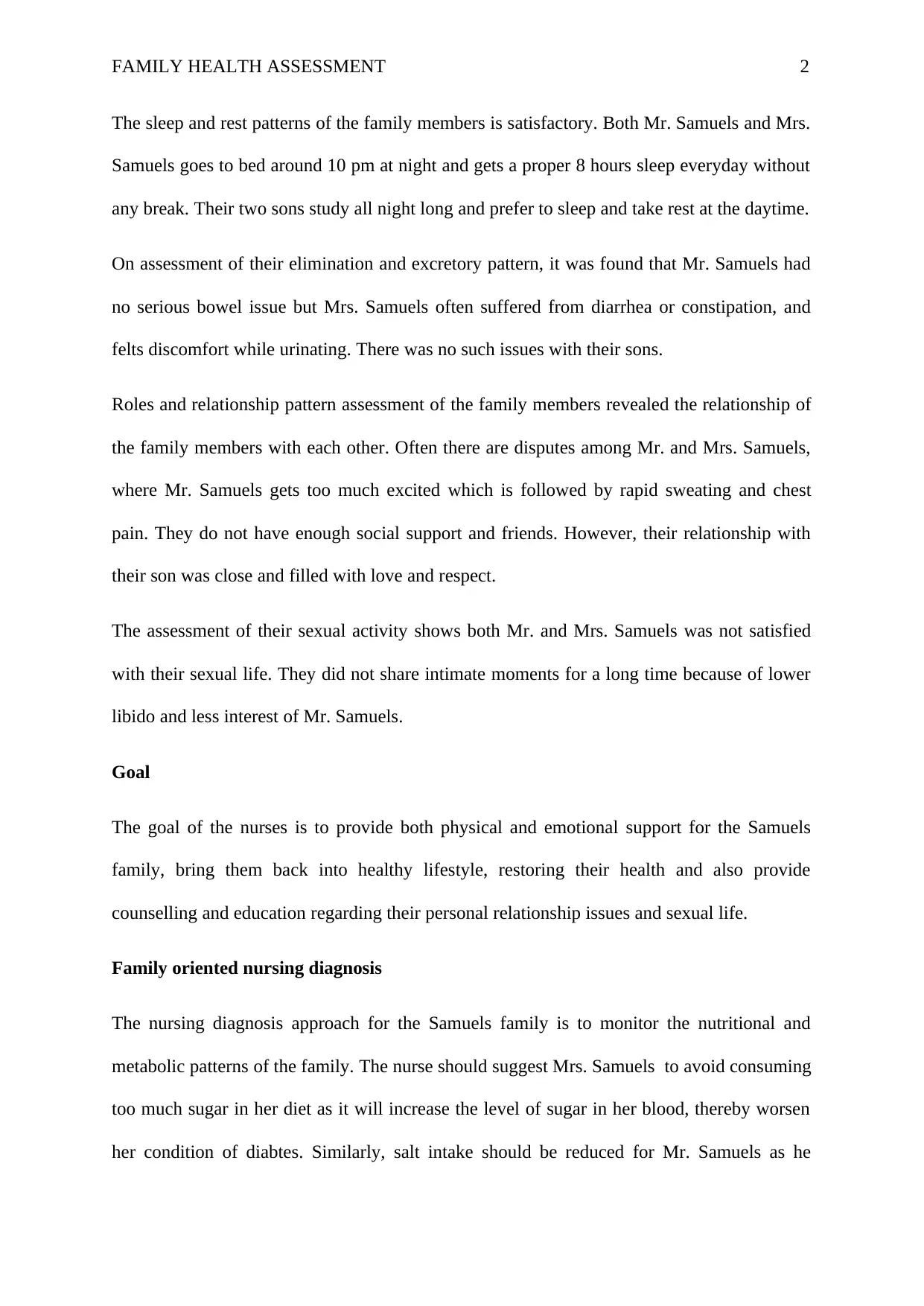
FAMILY HEALTH ASSESSMENT 2
The sleep and rest patterns of the family members is satisfactory. Both Mr. Samuels and Mrs.
Samuels goes to bed around 10 pm at night and gets a proper 8 hours sleep everyday without
any break. Their two sons study all night long and prefer to sleep and take rest at the daytime.
On assessment of their elimination and excretory pattern, it was found that Mr. Samuels had
no serious bowel issue but Mrs. Samuels often suffered from diarrhea or constipation, and
felts discomfort while urinating. There was no such issues with their sons.
Roles and relationship pattern assessment of the family members revealed the relationship of
the family members with each other. Often there are disputes among Mr. and Mrs. Samuels,
where Mr. Samuels gets too much excited which is followed by rapid sweating and chest
pain. They do not have enough social support and friends. However, their relationship with
their son was close and filled with love and respect.
The assessment of their sexual activity shows both Mr. and Mrs. Samuels was not satisfied
with their sexual life. They did not share intimate moments for a long time because of lower
libido and less interest of Mr. Samuels.
Goal
The goal of the nurses is to provide both physical and emotional support for the Samuels
family, bring them back into healthy lifestyle, restoring their health and also provide
counselling and education regarding their personal relationship issues and sexual life.
Family oriented nursing diagnosis
The nursing diagnosis approach for the Samuels family is to monitor the nutritional and
metabolic patterns of the family. The nurse should suggest Mrs. Samuels to avoid consuming
too much sugar in her diet as it will increase the level of sugar in her blood, thereby worsen
her condition of diabtes. Similarly, salt intake should be reduced for Mr. Samuels as he
The sleep and rest patterns of the family members is satisfactory. Both Mr. Samuels and Mrs.
Samuels goes to bed around 10 pm at night and gets a proper 8 hours sleep everyday without
any break. Their two sons study all night long and prefer to sleep and take rest at the daytime.
On assessment of their elimination and excretory pattern, it was found that Mr. Samuels had
no serious bowel issue but Mrs. Samuels often suffered from diarrhea or constipation, and
felts discomfort while urinating. There was no such issues with their sons.
Roles and relationship pattern assessment of the family members revealed the relationship of
the family members with each other. Often there are disputes among Mr. and Mrs. Samuels,
where Mr. Samuels gets too much excited which is followed by rapid sweating and chest
pain. They do not have enough social support and friends. However, their relationship with
their son was close and filled with love and respect.
The assessment of their sexual activity shows both Mr. and Mrs. Samuels was not satisfied
with their sexual life. They did not share intimate moments for a long time because of lower
libido and less interest of Mr. Samuels.
Goal
The goal of the nurses is to provide both physical and emotional support for the Samuels
family, bring them back into healthy lifestyle, restoring their health and also provide
counselling and education regarding their personal relationship issues and sexual life.
Family oriented nursing diagnosis
The nursing diagnosis approach for the Samuels family is to monitor the nutritional and
metabolic patterns of the family. The nurse should suggest Mrs. Samuels to avoid consuming
too much sugar in her diet as it will increase the level of sugar in her blood, thereby worsen
her condition of diabtes. Similarly, salt intake should be reduced for Mr. Samuels as he
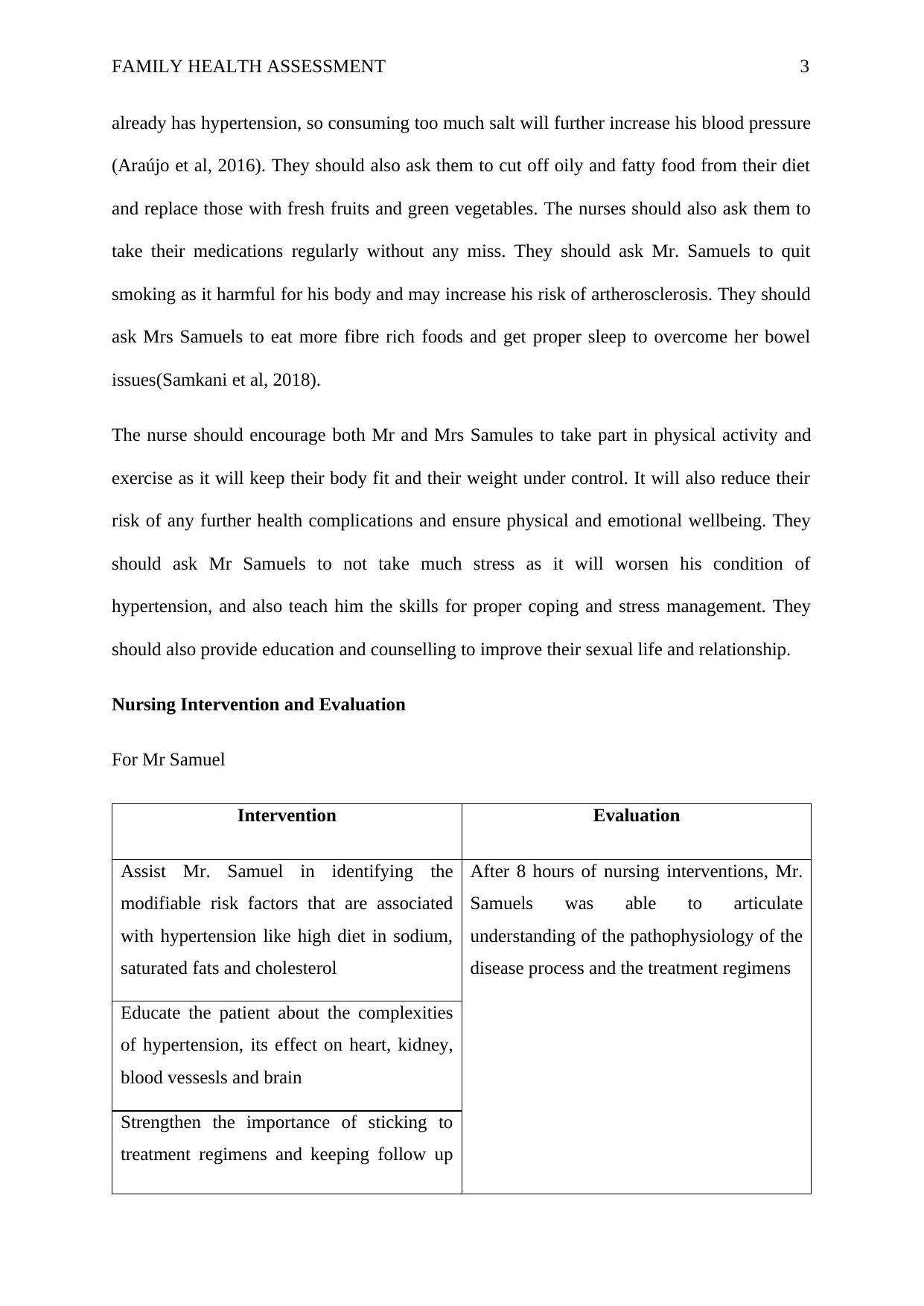
FAMILY HEALTH ASSESSMENT 3
already has hypertension, so consuming too much salt will further increase his blood pressure
(Araújo et al, 2016). They should also ask them to cut off oily and fatty food from their diet
and replace those with fresh fruits and green vegetables. The nurses should also ask them to
take their medications regularly without any miss. They should ask Mr. Samuels to quit
smoking as it harmful for his body and may increase his risk of artherosclerosis. They should
ask Mrs Samuels to eat more fibre rich foods and get proper sleep to overcome her bowel
issues(Samkani et al, 2018).
The nurse should encourage both Mr and Mrs Samules to take part in physical activity and
exercise as it will keep their body fit and their weight under control. It will also reduce their
risk of any further health complications and ensure physical and emotional wellbeing. They
should ask Mr Samuels to not take much stress as it will worsen his condition of
hypertension, and also teach him the skills for proper coping and stress management. They
should also provide education and counselling to improve their sexual life and relationship.
Nursing Intervention and Evaluation
For Mr Samuel
Intervention Evaluation
Assist Mr. Samuel in identifying the
modifiable risk factors that are associated
with hypertension like high diet in sodium,
saturated fats and cholesterol
After 8 hours of nursing interventions, Mr.
Samuels was able to articulate
understanding of the pathophysiology of the
disease process and the treatment regimens
Educate the patient about the complexities
of hypertension, its effect on heart, kidney,
blood vessesls and brain
Strengthen the importance of sticking to
treatment regimens and keeping follow up
already has hypertension, so consuming too much salt will further increase his blood pressure
(Araújo et al, 2016). They should also ask them to cut off oily and fatty food from their diet
and replace those with fresh fruits and green vegetables. The nurses should also ask them to
take their medications regularly without any miss. They should ask Mr. Samuels to quit
smoking as it harmful for his body and may increase his risk of artherosclerosis. They should
ask Mrs Samuels to eat more fibre rich foods and get proper sleep to overcome her bowel
issues(Samkani et al, 2018).
The nurse should encourage both Mr and Mrs Samules to take part in physical activity and
exercise as it will keep their body fit and their weight under control. It will also reduce their
risk of any further health complications and ensure physical and emotional wellbeing. They
should ask Mr Samuels to not take much stress as it will worsen his condition of
hypertension, and also teach him the skills for proper coping and stress management. They
should also provide education and counselling to improve their sexual life and relationship.
Nursing Intervention and Evaluation
For Mr Samuel
Intervention Evaluation
Assist Mr. Samuel in identifying the
modifiable risk factors that are associated
with hypertension like high diet in sodium,
saturated fats and cholesterol
After 8 hours of nursing interventions, Mr.
Samuels was able to articulate
understanding of the pathophysiology of the
disease process and the treatment regimens
Educate the patient about the complexities
of hypertension, its effect on heart, kidney,
blood vessesls and brain
Strengthen the importance of sticking to
treatment regimens and keeping follow up
⊘ This is a preview!⊘
Do you want full access?
Subscribe today to unlock all pages.

Trusted by 1+ million students worldwide
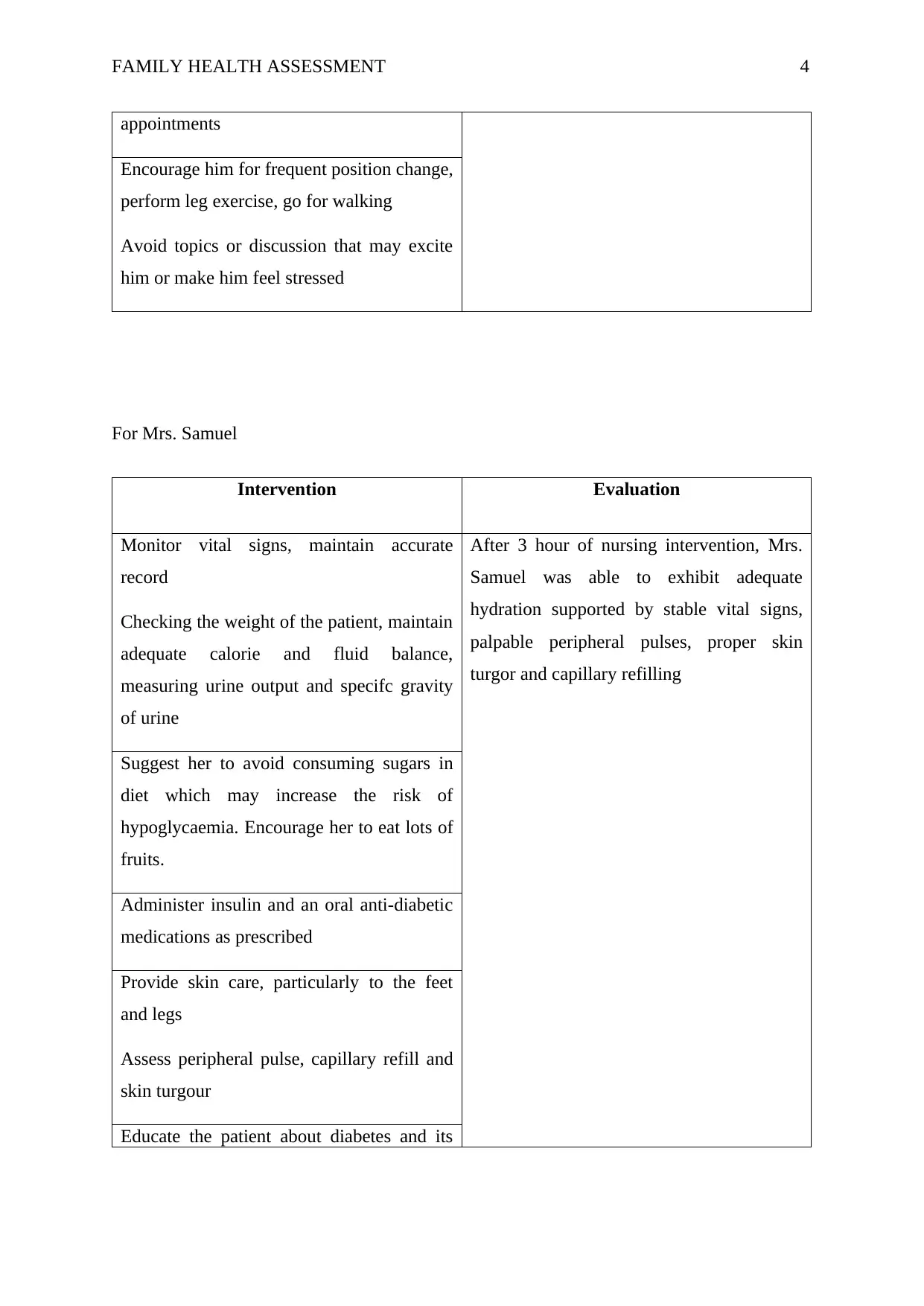
FAMILY HEALTH ASSESSMENT 4
appointments
Encourage him for frequent position change,
perform leg exercise, go for walking
Avoid topics or discussion that may excite
him or make him feel stressed
For Mrs. Samuel
Intervention Evaluation
Monitor vital signs, maintain accurate
record
Checking the weight of the patient, maintain
adequate calorie and fluid balance,
measuring urine output and specifc gravity
of urine
After 3 hour of nursing intervention, Mrs.
Samuel was able to exhibit adequate
hydration supported by stable vital signs,
palpable peripheral pulses, proper skin
turgor and capillary refilling
Suggest her to avoid consuming sugars in
diet which may increase the risk of
hypoglycaemia. Encourage her to eat lots of
fruits.
Administer insulin and an oral anti-diabetic
medications as prescribed
Provide skin care, particularly to the feet
and legs
Assess peripheral pulse, capillary refill and
skin turgour
Educate the patient about diabetes and its
appointments
Encourage him for frequent position change,
perform leg exercise, go for walking
Avoid topics or discussion that may excite
him or make him feel stressed
For Mrs. Samuel
Intervention Evaluation
Monitor vital signs, maintain accurate
record
Checking the weight of the patient, maintain
adequate calorie and fluid balance,
measuring urine output and specifc gravity
of urine
After 3 hour of nursing intervention, Mrs.
Samuel was able to exhibit adequate
hydration supported by stable vital signs,
palpable peripheral pulses, proper skin
turgor and capillary refilling
Suggest her to avoid consuming sugars in
diet which may increase the risk of
hypoglycaemia. Encourage her to eat lots of
fruits.
Administer insulin and an oral anti-diabetic
medications as prescribed
Provide skin care, particularly to the feet
and legs
Assess peripheral pulse, capillary refill and
skin turgour
Educate the patient about diabetes and its
Paraphrase This Document
Need a fresh take? Get an instant paraphrase of this document with our AI Paraphraser
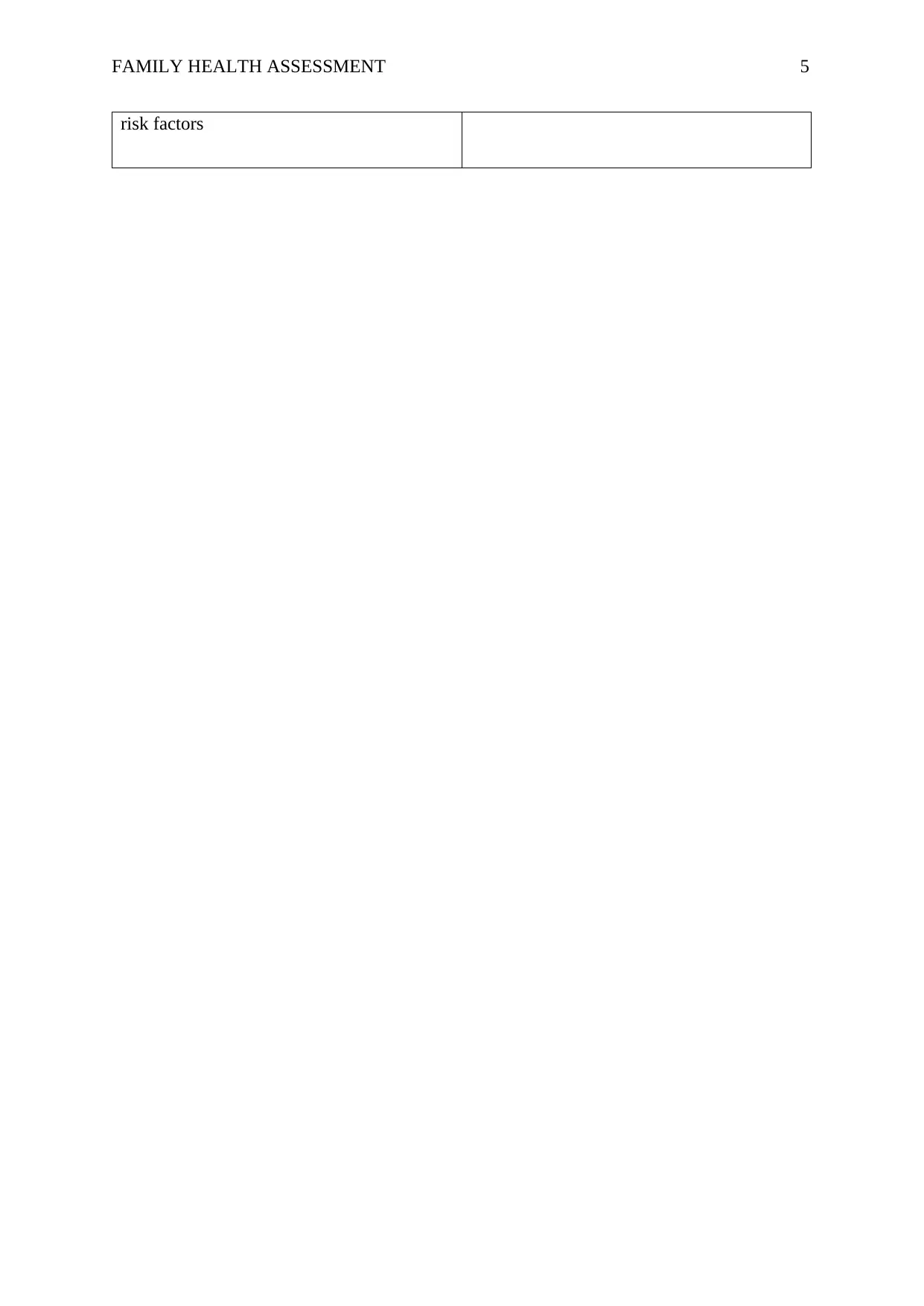
FAMILY HEALTH ASSESSMENT 5
risk factors
risk factors
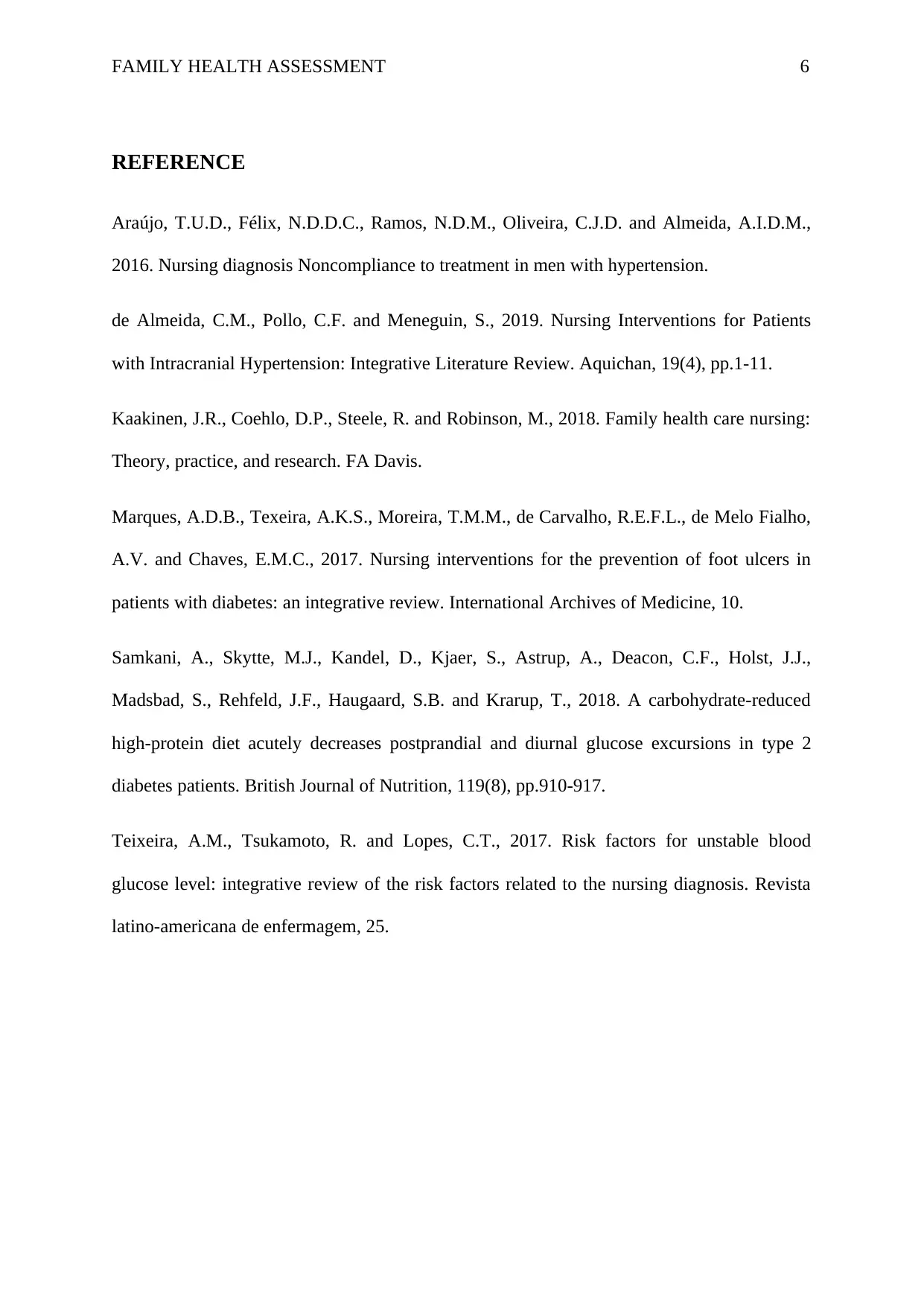
FAMILY HEALTH ASSESSMENT 6
REFERENCE
Araújo, T.U.D., Félix, N.D.D.C., Ramos, N.D.M., Oliveira, C.J.D. and Almeida, A.I.D.M.,
2016. Nursing diagnosis Noncompliance to treatment in men with hypertension.
de Almeida, C.M., Pollo, C.F. and Meneguin, S., 2019. Nursing Interventions for Patients
with Intracranial Hypertension: Integrative Literature Review. Aquichan, 19(4), pp.1-11.
Kaakinen, J.R., Coehlo, D.P., Steele, R. and Robinson, M., 2018. Family health care nursing:
Theory, practice, and research. FA Davis.
Marques, A.D.B., Texeira, A.K.S., Moreira, T.M.M., de Carvalho, R.E.F.L., de Melo Fialho,
A.V. and Chaves, E.M.C., 2017. Nursing interventions for the prevention of foot ulcers in
patients with diabetes: an integrative review. International Archives of Medicine, 10.
Samkani, A., Skytte, M.J., Kandel, D., Kjaer, S., Astrup, A., Deacon, C.F., Holst, J.J.,
Madsbad, S., Rehfeld, J.F., Haugaard, S.B. and Krarup, T., 2018. A carbohydrate-reduced
high-protein diet acutely decreases postprandial and diurnal glucose excursions in type 2
diabetes patients. British Journal of Nutrition, 119(8), pp.910-917.
Teixeira, A.M., Tsukamoto, R. and Lopes, C.T., 2017. Risk factors for unstable blood
glucose level: integrative review of the risk factors related to the nursing diagnosis. Revista
latino-americana de enfermagem, 25.
REFERENCE
Araújo, T.U.D., Félix, N.D.D.C., Ramos, N.D.M., Oliveira, C.J.D. and Almeida, A.I.D.M.,
2016. Nursing diagnosis Noncompliance to treatment in men with hypertension.
de Almeida, C.M., Pollo, C.F. and Meneguin, S., 2019. Nursing Interventions for Patients
with Intracranial Hypertension: Integrative Literature Review. Aquichan, 19(4), pp.1-11.
Kaakinen, J.R., Coehlo, D.P., Steele, R. and Robinson, M., 2018. Family health care nursing:
Theory, practice, and research. FA Davis.
Marques, A.D.B., Texeira, A.K.S., Moreira, T.M.M., de Carvalho, R.E.F.L., de Melo Fialho,
A.V. and Chaves, E.M.C., 2017. Nursing interventions for the prevention of foot ulcers in
patients with diabetes: an integrative review. International Archives of Medicine, 10.
Samkani, A., Skytte, M.J., Kandel, D., Kjaer, S., Astrup, A., Deacon, C.F., Holst, J.J.,
Madsbad, S., Rehfeld, J.F., Haugaard, S.B. and Krarup, T., 2018. A carbohydrate-reduced
high-protein diet acutely decreases postprandial and diurnal glucose excursions in type 2
diabetes patients. British Journal of Nutrition, 119(8), pp.910-917.
Teixeira, A.M., Tsukamoto, R. and Lopes, C.T., 2017. Risk factors for unstable blood
glucose level: integrative review of the risk factors related to the nursing diagnosis. Revista
latino-americana de enfermagem, 25.
⊘ This is a preview!⊘
Do you want full access?
Subscribe today to unlock all pages.

Trusted by 1+ million students worldwide
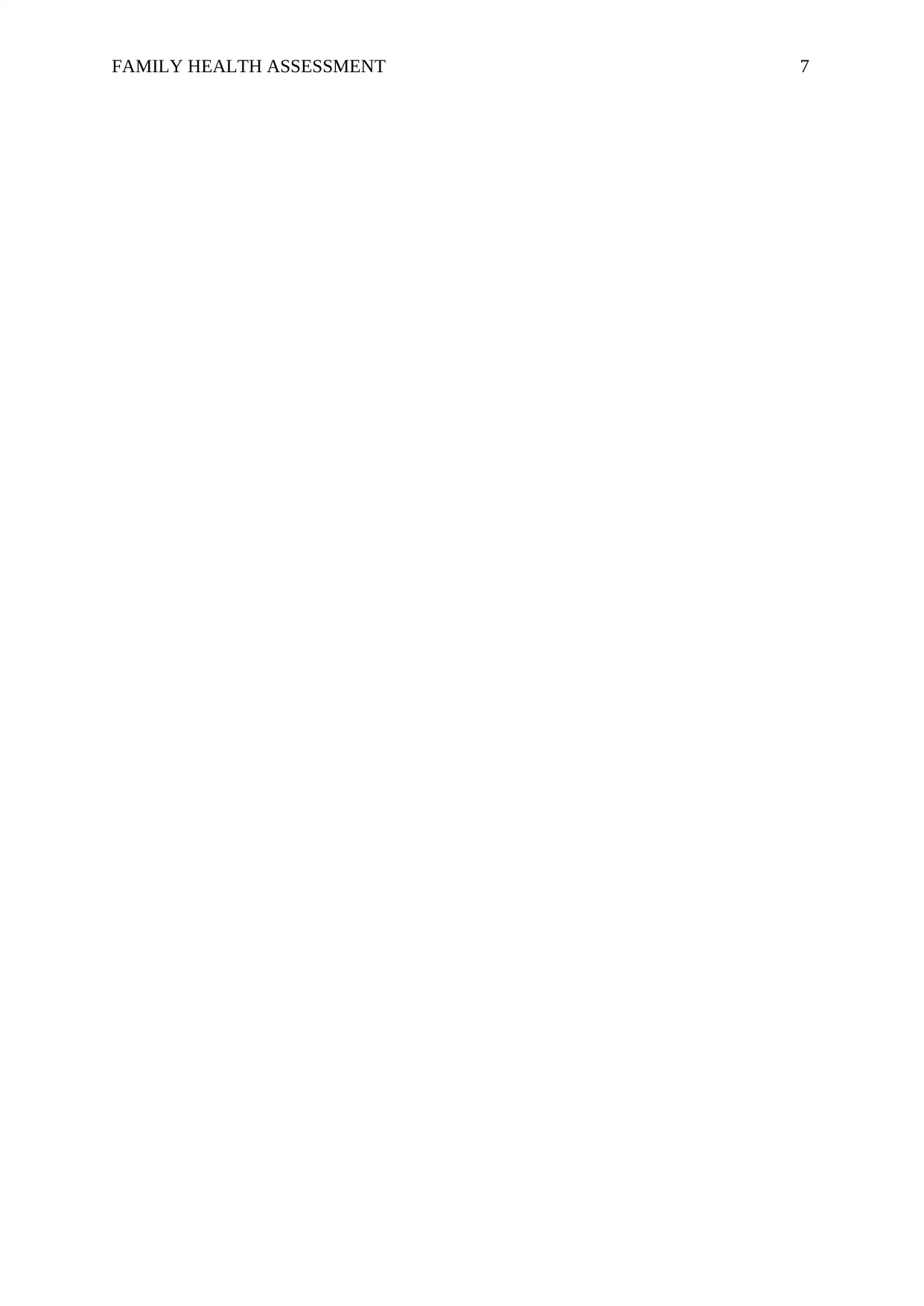
FAMILY HEALTH ASSESSMENT 7
1 out of 7
Related Documents
Your All-in-One AI-Powered Toolkit for Academic Success.
+13062052269
info@desklib.com
Available 24*7 on WhatsApp / Email
![[object Object]](/_next/static/media/star-bottom.7253800d.svg)
Unlock your academic potential
Copyright © 2020–2025 A2Z Services. All Rights Reserved. Developed and managed by ZUCOL.





